Funny People
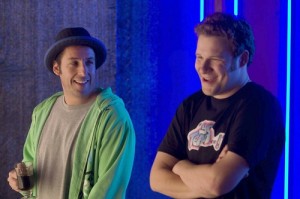 Last year’s biggest hit, The Dark Knight, proved a lot of things—about the strength of the franchise, about the positive financial advantages a movie has with a deceased star being the lead* (see: The Crow), and that you can change actors from film to film, such as with the part of Rachel Dawes, played by Katie Holmes in Batman Begins and swapped out for Maggie Gyllenhaal in The Dark Knight, and even if the character is rather important to the story, no one will much care. Most importantly, it proved that to the paying audience, you can never have too much movie, as The Dark Knight runs over 2 ½ hours. There’s nothing wrong with indulging a master technician like Christopher Nolan, and The Dark Knight has a thrilling conclusion, which unfortunately occurs at the 90 minute mark. We still have an hour of Aaron Eckhart brooding as Harvey “Bacon Face” Dent to go, a subplot which really should have had its own movie.
Last year’s biggest hit, The Dark Knight, proved a lot of things—about the strength of the franchise, about the positive financial advantages a movie has with a deceased star being the lead* (see: The Crow), and that you can change actors from film to film, such as with the part of Rachel Dawes, played by Katie Holmes in Batman Begins and swapped out for Maggie Gyllenhaal in The Dark Knight, and even if the character is rather important to the story, no one will much care. Most importantly, it proved that to the paying audience, you can never have too much movie, as The Dark Knight runs over 2 ½ hours. There’s nothing wrong with indulging a master technician like Christopher Nolan, and The Dark Knight has a thrilling conclusion, which unfortunately occurs at the 90 minute mark. We still have an hour of Aaron Eckhart brooding as Harvey “Bacon Face” Dent to go, a subplot which really should have had its own movie.
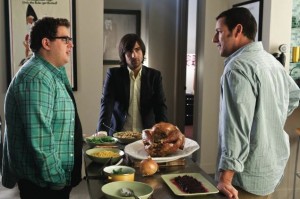 Judd Apatow, on the other hand, is not a master technician. But as long as his films make money, Universal, who also distributed Apatow’s other directing projects, The 40 Year-Old Virgin and Knocked Up, will indulge his need to overstuff his movies with endless improvisation. The 40 Year-Old Virgin really suffered from slack pacing, for every germane scene, there was a random bit that could have easily been left out, making it more of a stop-start movie with an obvious trajectory weighing it down. The cut released on DVD was 20 minutes longer than the theatrical cut (which was just under 2 hours) and it didn’t remedy anything. The bloating of the movie just gave you an excuse to hit the pause button to get a snack, since its lack of consistency meant it never required rapt attention. With Knocked Up, Apatow had the sense to combine the humor with a streamlined story that needed the ups and downs, as opposed to The 40 Year-Old Virgin, which is just a nagging wait for Steve Carrell to finally relax enough to have sex with Catherine Keener, without even any pretended suspense. Knocked Up is equal parts charming and funny, with the actors properly filling in what may not have been on the page, but Apatow cutting down the bits that would normally look like extraneous clowning around.
Judd Apatow, on the other hand, is not a master technician. But as long as his films make money, Universal, who also distributed Apatow’s other directing projects, The 40 Year-Old Virgin and Knocked Up, will indulge his need to overstuff his movies with endless improvisation. The 40 Year-Old Virgin really suffered from slack pacing, for every germane scene, there was a random bit that could have easily been left out, making it more of a stop-start movie with an obvious trajectory weighing it down. The cut released on DVD was 20 minutes longer than the theatrical cut (which was just under 2 hours) and it didn’t remedy anything. The bloating of the movie just gave you an excuse to hit the pause button to get a snack, since its lack of consistency meant it never required rapt attention. With Knocked Up, Apatow had the sense to combine the humor with a streamlined story that needed the ups and downs, as opposed to The 40 Year-Old Virgin, which is just a nagging wait for Steve Carrell to finally relax enough to have sex with Catherine Keener, without even any pretended suspense. Knocked Up is equal parts charming and funny, with the actors properly filling in what may not have been on the page, but Apatow cutting down the bits that would normally look like extraneous clowning around.
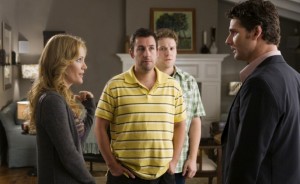 Funny People, on the other hand, falls into The Dark Knight category of just pure overkill and exhaustion. Apatow starts with footage of the real Adam Sandler making prank phone calls and segues into an older, depressed Sandler, basically playing himself but named George Simmons, a shallow, lonely, lowbrow comedy star, who is on his way to the doctor’s office where he is to be told he’s dying of cancer and he’ll have to try experimental medicine if he wants to survive. His reaction is go back to his roots, stand-up comedy, and express his loneliness and anger on the stage. And he hires Seth Rogen, who plays a sensitive, unsuccessful comic who writes jokes for Sandler. Their relationship is plenty for a comedy (“your job is to not cry”), but Apatow throws in another subplot that takes over the movie. George pines for his former flame (Laura, played by Apatow’s wife, Leslie Mann, surprisingly unshrill) and we get nearly an hour detour to Laura’s house, kids, unhappy marriage, and a reliving of all the selfish things that George did to Laura to cause her to leave. The new husband, Clarke (a rather poorly written role, played by former Hulk and stand-up comic Eric Bana), is a perpetual cheater and his contrived scenes of bonding and fighting with George drown the last act of the movie. Clarke doesn’t even show up until the 2 hour mark as if to underline the point that he’s unnecessary. Theoretically, he could have had his own movie, as Eckhart did, but he’s not nearly interesting or funny enough.
Funny People, on the other hand, falls into The Dark Knight category of just pure overkill and exhaustion. Apatow starts with footage of the real Adam Sandler making prank phone calls and segues into an older, depressed Sandler, basically playing himself but named George Simmons, a shallow, lonely, lowbrow comedy star, who is on his way to the doctor’s office where he is to be told he’s dying of cancer and he’ll have to try experimental medicine if he wants to survive. His reaction is go back to his roots, stand-up comedy, and express his loneliness and anger on the stage. And he hires Seth Rogen, who plays a sensitive, unsuccessful comic who writes jokes for Sandler. Their relationship is plenty for a comedy (“your job is to not cry”), but Apatow throws in another subplot that takes over the movie. George pines for his former flame (Laura, played by Apatow’s wife, Leslie Mann, surprisingly unshrill) and we get nearly an hour detour to Laura’s house, kids, unhappy marriage, and a reliving of all the selfish things that George did to Laura to cause her to leave. The new husband, Clarke (a rather poorly written role, played by former Hulk and stand-up comic Eric Bana), is a perpetual cheater and his contrived scenes of bonding and fighting with George drown the last act of the movie. Clarke doesn’t even show up until the 2 hour mark as if to underline the point that he’s unnecessary. Theoretically, he could have had his own movie, as Eckhart did, but he’s not nearly interesting or funny enough.
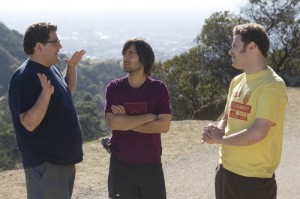 What is funny in Funny People is all the material dealing with stand-up comedy and Ira’s roommates Leo (played by Jonah Hill) and Mark (played by Jason Schwartzman) as a slightly more successful stand-up comic and a pandering sitcom star, respectively. Though it doesn’t make a lot of sense that Mark would have roommates, especially as he keeps flashing his enormous paychecks in front of Ira, their scenes are amusing because of Schwartzman’s expertise at playing smarmy. Sandler doesn’t do all that much with George, except mug and yell, but he’s a useful conduit for Apatow to justify all of the cameos from famous comics that he throws into the middle of the movie (boy, does Paul Reiser now look exactly like Colin Quinn) that are a nice distraction, if little else. Ira’s romance with a nerdy female comic, Daisy, gets short shrift, especially because Apatow’s plot structure leaves her off-screen for almost all of Act II and III. When she shows up again near the end, you almost have to remind yourself who she is.
What is funny in Funny People is all the material dealing with stand-up comedy and Ira’s roommates Leo (played by Jonah Hill) and Mark (played by Jason Schwartzman) as a slightly more successful stand-up comic and a pandering sitcom star, respectively. Though it doesn’t make a lot of sense that Mark would have roommates, especially as he keeps flashing his enormous paychecks in front of Ira, their scenes are amusing because of Schwartzman’s expertise at playing smarmy. Sandler doesn’t do all that much with George, except mug and yell, but he’s a useful conduit for Apatow to justify all of the cameos from famous comics that he throws into the middle of the movie (boy, does Paul Reiser now look exactly like Colin Quinn) that are a nice distraction, if little else. Ira’s romance with a nerdy female comic, Daisy, gets short shrift, especially because Apatow’s plot structure leaves her off-screen for almost all of Act II and III. When she shows up again near the end, you almost have to remind yourself who she is.
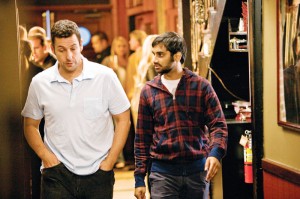 If there’s an advantage to all the improv, it is that the stand-up sequences have an unpolished feel to them, with Rogen especially nailing down how his insecurities off-stage expose themselves in the guise of endless masturbation and dick jokes on stage, obviously revealing the limitations of his skills as a comic. Aziz Ansari shows up as a Dane Cookish comedian named Randy, and he’s brilliant (there’s a ton of footage missing from the movie that was in the recent Comedy Central Funny People promotional special showing how far Anzari was willing to go with his character). He’s even funnier than his real stand-up, though that clearly informed his portrayal of a comic who’s energetically empty humor could only be funny to a hundred drunks with short attention spans at a nightclub. It makes you wonder why Apatow chose to make Funny People about Sandler, his real-life former roommate, who’s just an unsympathetic jerk turned into a mopey child, instead of Randy, the perfect clueless narcissist.
If there’s an advantage to all the improv, it is that the stand-up sequences have an unpolished feel to them, with Rogen especially nailing down how his insecurities off-stage expose themselves in the guise of endless masturbation and dick jokes on stage, obviously revealing the limitations of his skills as a comic. Aziz Ansari shows up as a Dane Cookish comedian named Randy, and he’s brilliant (there’s a ton of footage missing from the movie that was in the recent Comedy Central Funny People promotional special showing how far Anzari was willing to go with his character). He’s even funnier than his real stand-up, though that clearly informed his portrayal of a comic who’s energetically empty humor could only be funny to a hundred drunks with short attention spans at a nightclub. It makes you wonder why Apatow chose to make Funny People about Sandler, his real-life former roommate, who’s just an unsympathetic jerk turned into a mopey child, instead of Randy, the perfect clueless narcissist.
* This is a little bit unfair because Heath Ledger’s performance as The Joker is actually quite exceptional, but his posthumous awards will always look like suck-ups to the dead, as opposed to deserved.



